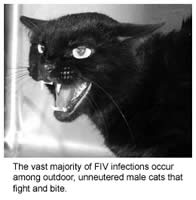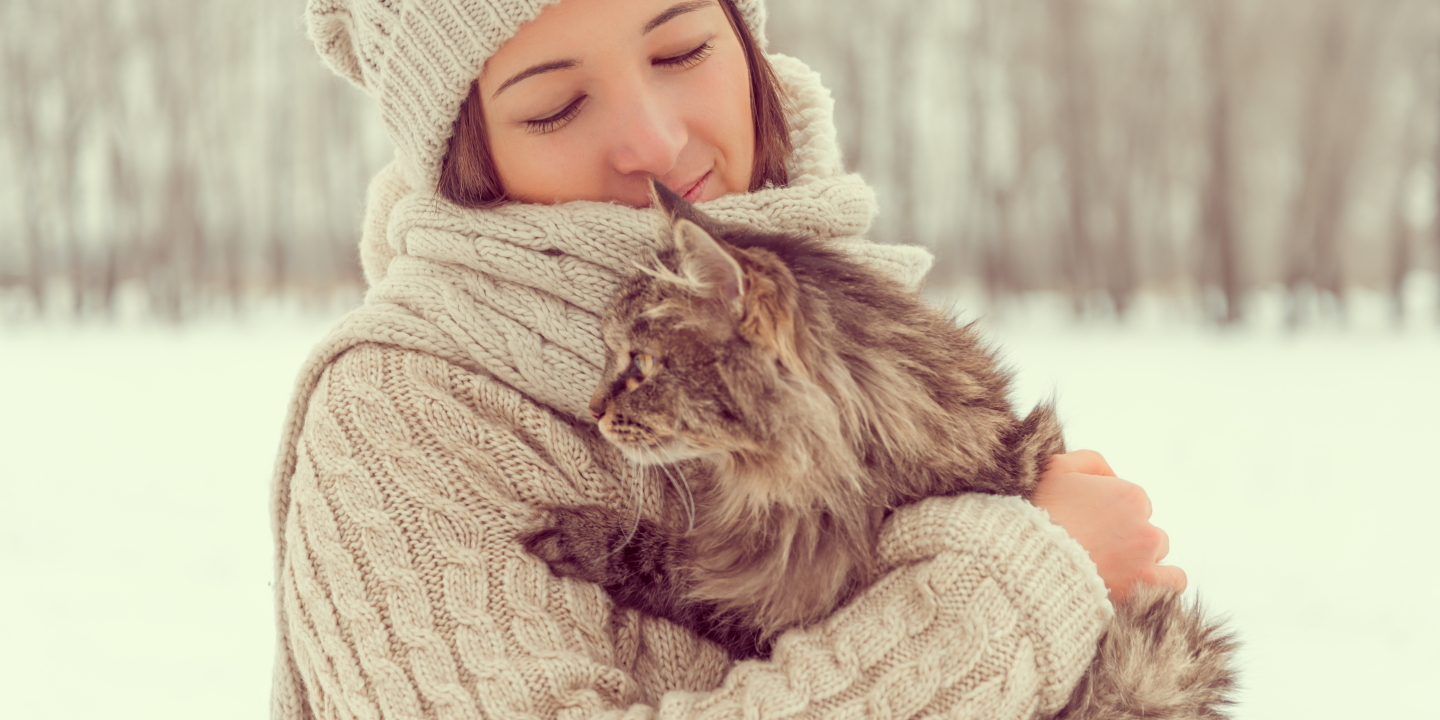On the Lookout for FIV
Owners are urged to have their cats tested for feline immunodeficiency virus.
 Is your cat a hot-tempered, unneutered male who spends a lot of time outdoors and seems to like nothing more than scrapping with the other guys in the neighborhood? If so, he's at especially high risk for infection with the feline immunodeficiency virus (FIV), a submicroscopic, parasitic organism that can weaken his immune system and, in time, make him vulnerable to a host of opportunistic diseases.
Is your cat a hot-tempered, unneutered male who spends a lot of time outdoors and seems to like nothing more than scrapping with the other guys in the neighborhood? If so, he's at especially high risk for infection with the feline immunodeficiency virus (FIV), a submicroscopic, parasitic organism that can weaken his immune system and, in time, make him vulnerable to a host of opportunistic diseases.
Deep bite wounds, notes Julie Levy, DVM, PhD, are, by far, the primary mode of the virus's transmission from an infected to an uninfected animal. And pugnacious free-roaming males are more likely, by far, than other felines to bite them.
 Destructive Organisms
Destructive Organisms
Virologists classify FIV as a lentivirus, a slow-acting organism that is in the same viral family as the potentially deadly human immunodeficiency virus (HIV), says Dr. Levy, associate professor of small animal internal medicine at the University of Florida's College of Veterinary Medicine. But these viruses are species-specific. A cat cannot contract HIV from a human, and a human cannot be infected by FIV through contact with an infected cat.
The organism is also classified as a retrovirus, a type of virus containing reverse transcriptase, an enzyme that converts the viral genetic material - in this case, RNA or ribonucleic acid - into DNA or deoxyribonucleic acid that is subsequently inserted into the infected cat's genetic blueprint. According to Dr. Levy, virus is found in all body fluids of an infected cat, and is especially abundant in its saliva.
Following initial infection, virus is carried to the animal's major lymph nodes, where the organism replicates within disease-fighting white blood cells called T-lymphocytes. Particularly vulnerable are lymphocytes known as CD4 cells (or T-helper lymphocytes), which play a key role in the animal's immune system. This insidious cycle continues unhampered as the virus circulates throughout the body, invades additional lymph nodes and destroys more CD4 cells.
Disease Progression
According to Dr. Levy, the earliest stage of infection is likely to pass unnoticed by the cat's owner. "The animal may run a fever," she says, "as its white blood cell count decreases. The lymph nodes will swell, but this is a subtle occurrence and you're probably not going to be aware of it." In fact, an FIV-positive cat is likely to appear normal for many years following initial infection.
Eventually, however, evidence of the animal's compromised immune system will start emerging as the same bacteria, viruses and fungi that previously existed harmlessly in the animal's normal environment begin to cause illness.
The most commonly observed clinical signs of FIV infection, says Dr. Levy, include inflammation of the mucous tissue of the mouth (stomatitis), inflammation of the middle layer of the eye (uveitis), and various cancers, especially of the lymphatic tissue (lymphoma).
Other frequent consequences include chronic skin infections, gastrointestinal upset and persistent diarrhea, urinary system problems, respiratory tract infections, neurological disorders, and, in females, reproductive failures such as spontaneous abortion.
Some infected cats experience recurrent illness interspersed with periods of relative good health. In most cats, however, susceptibility to opportunistic diseases increases progressively as the animal's immune system is repeatedly challenged by successive episode of illness.
Most Susceptible
Compared to all other feline health threats, FIV infection is "quite common," according to Dr. Levy. "We estimate that about four percent of all feral cats in the U.S. are infected," she says. "Looking at all cats, feral and otherwise, who are diagnosed with FIV, we find that about 25 percent are female and about 75 percent are male. The condition is rare among kittens, because they don't start in with their high-risk behavior until they're older. So, although older cats are more vulnerable, age in itself is not a determining factor. It's a behavioral issue."
Although sexual contact is a common mode of transmission in HIV, the same does not hold true for FIV, says Dr. Levy, despite the virus's presence in feline semen and other genital secretions. "We don't know why this is," she says, "but it appears that a cat's immune system is better able to ward off the virus when it is sexually transmitted than when it is transmitted by biting."
Likewise, while it is known that HIV can be transmitted from an infected human mother to her offspring while nursing, this is uncommon in cats. A queen's milk contains antibodies to FIV-protein substances that the body produces to weaken or destroy the virus.
These antibodies, Dr. Levy explains, are passed along to a kitten during its first nursing and "win the battle over the virus most of the time," as long as the kitten begins to nurse immediately following its birth, which most kittens do. (This is not the case in humans.) "Unfortunately," she points out, "kittens can't absorb the antibodies after the first day, so if they delay nursing for a day, they are likely to become infected."
Dr. Levy finds little evidence to support the notion that FIV can be transmitted by fleas and other such blood-sucking parasites. Similarly, she disputes the idea that some feline breeds are more susceptible than others. At the same time, she notes that purebred cats are less vulnerable due to the "low-exposure" conditions of their environment, the control of their behavior, and the tendency among breeders to adopt rigorous FIV testing procedures for their valuable animals.
"There is some evidence that casual contact among friendly animals in a multiple-cat household increases the risk for infection," says Dr. Levy. "So they may not be completely safe just because they don't fight."
But the bottom line, she says, is that the vast majority of FIV infections occur among "outdoor, unneutered male cats that fight and bite."
Detecting FIV
Diagnosis of infection is based on a cat's history, clinical signs, and the results of a blood test for FIV antibodies. "All cats should be tested at least once in their lives," says Dr. Levy. "For a cat who is not in a high-risk category, the test should be done when you first acquire the animal. Cats in a high-risk group or those in a multiple-cat household in which there is an FIV-positive cat or a cat with unknown FIV status should be tested every year. And just to be safe, a cat who has recently become ill should be retested."
The presence of antibodies - a "positive" result - indicates that a cat is infected with FIV and is thus capable of transmitting the virus to other cats. A "negative" result indicates that antibodies directed against FIV have not been detected, which usually means that the cat is not infected. Sometimes, however, the antibody tests are either inconclusive or conflicting. Depending on a variety of factors, either a different type of blood test should be done or the cat should be retested within the following two or three months.
The cost of a blood test for FIV is variable but always relatively inexpensive, says Dr. Levy, ranging typically from $15 or so in high-volume veterinary hospitals to about $60 in some private clinics. Despite the modest outlay, she laments, owners are not doing a good job of having their animals tested for FIV. "Based on the sales of blood-sampling kits to veterinarians," she says, "we know that less than 10 percent of cats in the U.S. are tested."
An Optimistic Outlook
Although a vaccine against FIV has been developed, cats that have been vaccinated will test positive, and its efficacy against all strains of the virus is yet to be determined. And there is, at present, no remedy for the infection. But, as Dr. Levy points out, the reasons for testing for FIV are compelling. One reason, of course, is that testing identifies those cats that must be kept isolated from others in order to curb the spread of the infection. As important, she notes, is that testing identifies cats that will need special attention for the rest of their lives. Dr. Levy urges owners of FIV-positive cats to approach their care-giving with optimism.
"Don't treat the test results," she advises. "Instead, treat the cat that is in front of you. In my experience, FIV-positive cats will respond very well to treatment if they are diagnosed early and the problems they encounter are addressed promptly. They can have many years of high-quality life."




